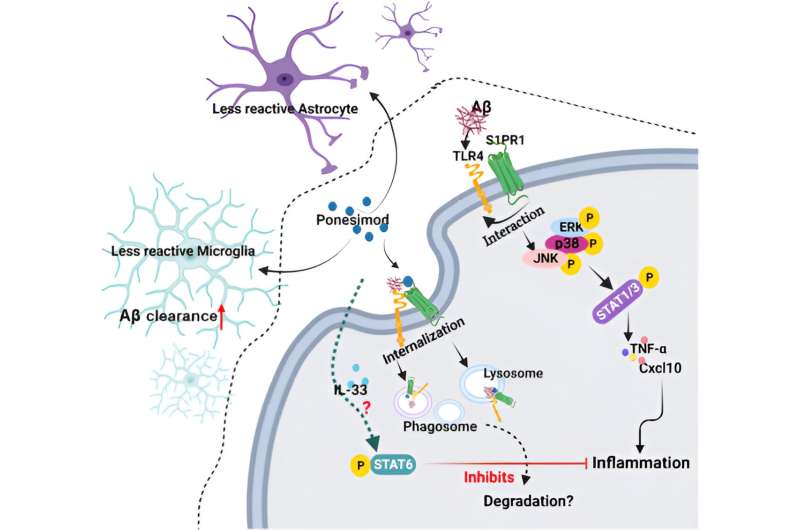This article has been reviewed according to Science X's editorial process and policies. Editors have highlighted the following attributes while ensuring the content's credibility:
fact-checked
peer-reviewed publication
trusted source
proofread
Researchers show multiple sclerosis drug can be used as Alzheimer's therapy

A team of researchers at the University of Kentucky has found that a drug used to treat multiple sclerosis (MS) is potentially effective as a therapy for Alzheimer's disease.
Alzheimer's is a progressive and irreversible neurological disorder. It's estimated 6.2 million Americans aged 65 and older are living with the disease that affects cognitive function, memory and behavior.
"We stand at the threshold of a critical endeavor to develop new treatment strategies against Alzheimer's disease," said Erhard Bieberich, Ph.D., a professor in the Department of Physiology in the UK College of Medicine. "We've uncovered that a medication already on the market, ponesimod (brand name 'Ponvory'), can reduce one of the hallmarks of this disease: neuroinflammation."
The findings were published in the journal eBioMedicine, part of The Lancet Discovery Science series in August.
The team studied ponesimod, an oral medication that the U.S. Food and Drug Administration (FDA) has approved to treat relapsing forms of MS. The medication reduces inflammation in the brain by targeting a specific receptor in the immune system to help regulate the body's response and prevent it from attacking the central nervous system. This receptor is activated by a lipid termed sphingosine-1-phosphate, the function of which is studied by the Bieberich lab.
"We are the first to show that ponesimod is effective in a mouse model for Alzheimer's disease," said Bieberich. "Since this drug is already in clinical use for therapy of relapsing multiple sclerosis, it is immediately available to be used in Alzheimer's disease therapy as well."
UK researchers homed in on a specific type of cell found in the central nervous system called microglia. The cells have several functions in our bodies, including regulating inflammatory responses in the central nervous system—the brain and the spinal cord.
Dysfunctional microglia are connected to neurodegenerative diseases like Alzheimer's because those cells help clear out the buildup of abnormal protein deposits in the brain—a distinct characteristic of the disease. Those buildups disrupt the communication between the brain's nerve cells and eventually die off.
"The clearance of those proteins is an important target for Alzheimer's disease therapy," said Zhihui Zhu, Ph.D., first-author of the study and one of the scientists in Bieberich's lab. "In our study, we reprogrammed microglia into neuron-protective cells that clean up toxic proteins in the brain, reduce Alzheimer's neuroinflammatory pathology, and improve memory in the mouse model."
As part of the project, researchers studied mice with specific genetic strains that express the major features of Alzheimer's in their brains. They treated half of the mice with ponesimod and measured specific cell activity in the brain. The mice's spatial memory was also tested through a maze behavior test.
"That specific test is a measure of the spontaneous tendency of the mice to alternate their free choices to enter the two arms of the maze," said Zhu. "Our tests indicate ponesimod rescues attention and working memory in mice with advanced Alzheimer's pathology."
Scientists also worked with UK's Alzheimer's Disease Research Center within the Sanders-Brown Center on Aging to obtain human brain samples to study. The data collected from those tests were consistent and also indicated ponesimod can be used as a therapy for Alzheimer's.
"Neuroinflammation is a hallmark of Alzheimer's, one of the major causes for disease progression and a promising target for therapy," said Bieberich. "Our study shows strong experimental evidence that ponesimod may be a therapeutic drug, which not only reduces neuroinflammation but also enhances the clearance of neurotoxic proteins in the brain in middle and late-stage Alzheimer's."
More information: Zhihui Zhu et al, The S1P receptor 1 antagonist Ponesimod reduces TLR4-induced neuroinflammation and increases Aβ clearance in 5XFAD mice, eBioMedicine (2023). DOI: 10.1016/j.ebiom.2023.104713




















